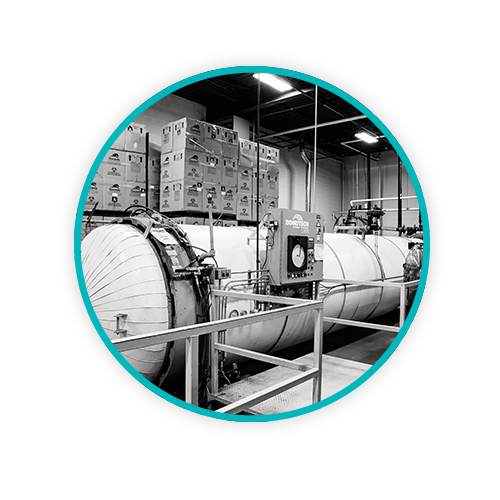A Guide to Wisconsin Medical Waste Regulations

With over 30 years of experience, we know what it takes to stay compliant with healthcare waste management in the state of Wisconsin. Use this blog to review some of the need to know local guidelines in managing your healthcare waste.
Short on time? Click below to jump to a topic of your choice:
- How does Wisconsin define medical waste
- Medical waste regulations and codes in Wisconsin
- Transportation and treatment medical waste in Wisconsin
- Infectious waste regulations
- OSHA and Wisconsin waste regulations
- Partnering with Daniels Health
Wisconsin medical waste disposal regulations are regulated by the Wisconsin Department of Natural Resources. As with other states, Wisconsin must also follow federal guidelines in regard to healthcare waste segregation, collection, transportation, and ultimate disposal. Numerous federal agencies provide such guidelines such as:
- Environmental Protection Agency (EPA)
- Department of Transportation (DOT)
- Resource Conservation and Recovery Act (RCRA)
- Wisconsin Department of Health Services (WisDHS)
- Wisconsin Department of Natural Resources (DNR/NR codes)
- Occupational Safety and Health Administration (OSHA)
The scope of regulations and codes found within the legislative codes for each state in the US are a little too complex and detailed to cover in one article, so we have broken it down to basic “how-to” in regard to medical waste regulations and their scope for all Wisconsin healthcare providers.
How does Wisconsin define medical waste?
Let’s start with definitions… Infectious waste, per the Wisconsin code, specifically focuses on waste reduction, recovery and recycling. It defines pathogens as being contaminated with sufficient virulence and quality to expose humans or animals to that solid waste, resulting in potential contraction of an infectious disease. [§287.07(7)(c)1.c, Wisc. Stats.] Terminology for Wisconsin medical waste regulations defines medical waste to mean both infectious waste and other waste that either contains or is mixed with infectious waste. [§299.51(1)(b), Wis. Stats.]
Some regulations and their terminology can be confusing. For example, Wisconsin law states that medical waste doesn’t necessarily imply that it must be produced by healthcare facilities. Furthermore even non-infectious materials from a healthcare facility can be defined as ‘regular’ medical waste if the medical waste generator manages or mixes them as though they were indeed medical waste.
At its most basic definition, infectious medical waste includes:
- Blood or body fluids
- Sharps – including disinfected and/or unused sharps
- Human or animal tissues containing any bodily fluid or infectious substance
- Microbiological medical waste
After definitions of medical waste are resolved, understanding and maintaining compliance with Wisconsin’s medical waste regulations is easier.
Wisconsin’s medical waste regulations statutes and codes
Specific codes and guidelines pertaining to medical waste disposal in Wisconsin are found under Wisconsin’s Administrative Codes 526.01 through 526.22. Medical waste regulations pertaining to infectious medical waste disposal can be found under chapter 287.
Medical and healthcare waste management is covered by Chapter NR 526 of the Department of Natural Resources (DNR). These codes cover applicable situations for medical waste and include collection and disposal methods for:
- Infectious waste (526.05)
- Trace chemotherapy waste (526.055)
- Source separation, handling, containment, storage and transfer, transportation and shipping (526.06-526.10)
- Treatment methods (526.11)
- Treatment facilities (526.12)
- Disposal (526.13)
- Records and infectious waste manifests (526.14)
- Infectious waste annual reports (526.15)
Regulations are explicit in regard to sorting waste. Under NR 526.06, it is not acceptable to mix infectious waste in the same container or bag with non-infectious waste unless doing so protects the health and safety of an employee or patient. Segregation plays an essential part in safe healthcare waste management both in the protection of staff and patients, and in achieving compliance.
Another regulation (NR 526.07) restricts individuals from transporting infectious waste from a generator property unless that waste is in a container that protects that person from exposure to potentially infectious waste. At Daniels we have designed medical waste systems that meet all practical and compliant clinical requirements – sharps and medical waste containers that are designed with a leak-proof seal, secure locking mechanisms, and transported in a purpose-designed housing to eliminate risk of cross-contamination.
How is medical waste transport and treatment managed in Wisconsin?
Transportation and shipping guidelines are strict in regard to licenses and operating requirements, especially those transporting infectious waste. Approved treatment methods in Wisconsin are carefully defined in NR 526.11. Destruction or disinfection of infectious wastes in Wisconsin can be achieved through:

- Incineration
- Heat and Steam disinfection via Autoclave
- Chemical disinfection
- Mechanical grinding and chemical disinfection
- Mechanical grinding and heat disinfection
- Gas disinfection
Wisconsin administrative codes encourage medical waste reduction through audits and well as healthcare waste management implementation and assessments. At Daniels, we believe strongly in waste audits to facilitate education that drives behavior change. Poor segregation not only threatens compliance and safety, but the over-classification of solid waste or even medical waste can have a huge cost impact on a healthcare facility. Different categories of medical waste must follow specific regulations and guidelines in regard to waste streams, collection, handling, transportation, and ultimately, destruction. Emphasis is on safety. Regulations for the handling of hazardous and nonhazardous medical waste are clearly defined.
While states may use different terminology to define categories and types of medical waste, key categories break down into hazardous medical waste and non-hazardous medical waste. According to Wisconsin’s definition, infectious waste is defined as any waste that contains any type of pathogen – including blood and/or human tissue – that may pass on an infectious disease to a human or an animal. Prime examples would be sharps, such as needles, lancets, or syringes.
Wisconsin’s infectious waste regulations
Wisconsin enforces a number of statues and codes specifically attributable to infectious waste:
- State statute 287.07 (7) and (8) – Medical Waste Reduction
- State statute 299.51 (3)– Medical Waste Management
- State statute 285.63 (10) – Medical Waste Incinerators
Wisconsin Administrative Codes include Ch. 500 – General Solid Waste Management Requirements:
- S. NR 500.3 (regarding terminology)
- Ch. 502.05 – Requirements for licensing for a solid waste facility and includes storage of infectious waste
- Ch. 520 – Regards Solid Waste Management Fees and Financial Responsibility Requirements
- Ch. 526 – Medical Waste Management
Minimum safety requirements are also applicable to all waste generators, and can be found in the following safety-related requirements:
- NR 526.06 – Separation of waste
- NR 526.07 – Containing infectious waste
- NR 526.08 – Handling of infectious waste
- NR 526.09(4) – Storage and transferring infectious waste
- NR 526.10(3) – Transportation and shipment of infectious waste
- NR 526.11 and 526.12(4) – Treatment of infectious waste
- NR 526 – Disposal of infectious waste
Additional administrative requirements apply in regard to licensing and manifests as well as recordkeeping and annual reports (NR 526.09-526.15). Having a waste partner that provides easy access to manifests is essential. Wisconsin’s legislative guidelines and the DNR terminology applicable to Wisconsin statues 289 and 299, as well as to NR chapters 500 to 538 are found in NR§500.03.
OSHA and Wisconsin healthcare waste regulations
In addition to federal and state guidelines, OSHA also enforces regulations for medical waste that includes sharps management, infectious/medical waste and specific requirements for containers that store medical waste. They also provide guidelines for approved bags and containers and the use of such by healthcare employees in any animal or human treatment facility.
Wisconsin is one of 26 states fully covered by federal OSHA standards and programs, and in the healthcare field, they cover:
- Hazardous waste operations
- Maintenance and access to emergency response standards
- Hazard communications standards (HCS) requirements for RCRA and non-RCRA waste
OSHA’s general industry standards and guidelines for Wisconsin in regard to medical waste management can be found under 29 CFR 1910 and cover such issues as:
- Personal protective equipment
- Eye and face protection
- Bloodborne pathogens
- Respiratory protection
- Protective measures to guard against certain hazardous chemicals in laboratories and other healthcare facility scenarios
12 Years of managing healthcare waste in Wisconsin has taught us a few things
 Our team at Daniels Health, have been safeguarding the healthcare waste management of Wisconsin facilities for over a decade. With a local clean processing plant based in Sturtevant Wisconsin, we ensure that transport and treatment is managed in full compliance within state borders.
Our team at Daniels Health, have been safeguarding the healthcare waste management of Wisconsin facilities for over a decade. With a local clean processing plant based in Sturtevant Wisconsin, we ensure that transport and treatment is managed in full compliance within state borders.
Servicing some of Wisconsin’s largest hospitals such as Aurora, as well as hundreds of surgical centers, physicians offices, oncology centers and veterinary clinics, we have local experience in navigating Wisconsin’s often intimidating and confusing medical waste regulations applicable for healthcare waste generators. Through our clinically designed products, services and education tools, Daniels Health improves the compliance profile of all facilities it works with in accordance to federal and state standards and regulations. For long-term sustainability solutions and safety in healthcare waste segregation, transportation, and disposal, you can rely on us. Daniels Health is passionate about creating solutions that reduce risk of injury or exposure to infectious wastes.
If you are a Wisconsin-based facility and looking for a long-term healthcare waste management partner you can trust, reach out to us today Alternatively find out more about our Wisconsin operations and service capabilities on our Wisconsin service page here.
Let's Talk!
Your time is valuable, and we don’t want to play hard to get. You can either phone us directly on the details listed on our contact page, or feel free to fill out this short form and one of our team members will get back to you as quickly as possible.
